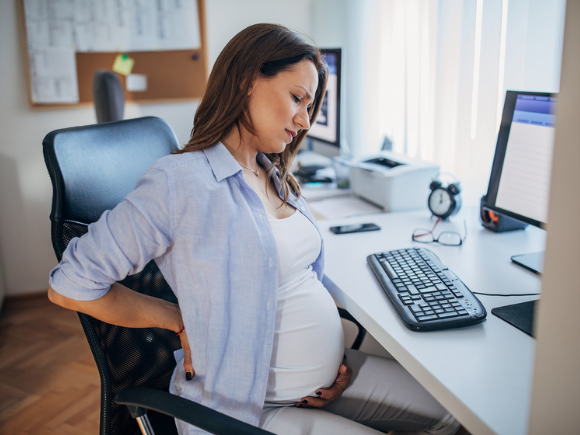
Decoding Pregnancy Pains: Causes, Coping Mechanisms, and When to Call the Doctor
As your body changes throughout your pregnancy, pregnancy pains and discomforts can arise. This can be because of the hormonal changes in your body and relaxation of your ligaments. As your pregnancy progresses, physical changes in your body are the likely culprits.
If you’re concerned about any of your pregnancy aches or pains talk to your healthcare professional for advice. The good news is there might be ways to ease your minor pregnancy aches and pains.
Understanding different types of pregnancy pains
From general cramping in early pregnancy to leg cramps during pregnancy and even hip pain during pregnancy, the journey towards motherhood can be marked with various discomforts. It's vital to differentiate between typical and unusual pregnancy pains.
Common pregnancy pains are generally mild and are a result of the changes your body undergoes. These include round ligament pain (a sharp ache in the lower abdomen), and back pain during pregnancy (often due to the extra weight and changes in posture).
Unusual pregnancy pains, such as severe stomach pain in pregnancy, especially if accompanied by bleeding or a fever, require immediate medical intervention. Similarly, intense back pain or pelvic pressure could indicate preterm labour, requiring urgent medical attention.
As your body gears up for childbirth, hormone levels, like relaxin, increase to loosen ligaments and joints. This, coupled with the physical strain of carrying a baby, can contribute to pregnancy body aches. It's important to remember that every pregnancy is unique, and what might be typical for one woman may not be for another. Always consult your obstetrician or midwife if you're concerned about any pregnancy pains.
Managing common pregnancy aches
Experiencing various pregnancy discomforts and pains, for example leg cramps during pregnancy, are common. Fortunately there are several ways to help ease these common discomforts, and are expanded on below.
A balanced diet plays a key role in managing pregnancy body aches. Consuming a diet rich in fruits, vegetables, whole grains, and lean proteins can help alleviate constipation. Keeping hydrated and having regular, small meals can help manage nausea and fatigue.
Gentle exercises like walking, swimming, and prenatal yoga, under the supervision of your healthcare provider, can help boost circulation, reduce aches and promote overall wellbeing. Rest and relaxation are equally important. Taking breaks, practicing deep breathing exercises, and getting enough sleep can help ease fatigue and promote a healthier pregnancy.
When to seek medical intervention
Being vigilant about any unusual pains or complications during pregnancy is crucial. While some discomfort is expected, certain signs should not be dismissed. Regular check-ups and open communication with your obstetrician or midwife are vital for your wellbeing and that of your baby.
Understanding the warning signs is critical for your and your baby's safety. Severe or persistent pain, particularly in the abdomen or pelvic area, should not be ignored. Any bleeding, light spotting or heavy flow, should be reported to your healthcare professional. Unusual discharge, like a strong odour, unusual colour, or excessive amount, may also indicate a problem and should be discussed with your healthcare professional.
If you are unsure whether a symptom or pain is normal or requires medical attention, it's always best to consult with your doctor.
Pregnancy pain relief techniques and treatments
There are safe and effective techniques and treatments available to help manage discomfort during pregnancy. If you are experiencing pregnancy aches, here is a handy list of coping strategies for you:
• Pain relief
If you need pain relief during pregnancy, check with your healthcare professional regarding which is best for you. It’s usually okay to take paracetamol, however it is best to confirm this with your healthcare professional first. Over the counter pain relief may provide short term relief if you’re experiencing minor aches or pains but should not be taken in high doses or for too long.
• Physiotherapy, massage, and other non-pharmacological pain relief methods
Non-pharmacological methods can be very effective in reducing pregnancy aches. Physiotherapy exercises can help improve posture and alleviate back pain during pregnancy. Massage therapy can provide relief by targeting specific areas of discomfort. Techniques like acupuncture and prenatal yoga may also offer relaxation and pain relief.
• Lift items safely
It’s easier to injure yourself during pregnancy so avoid lifting anything heavy when possible. Ask others for help so that you don’t put extra strain on your body. If you have to pick up something light, don’t bend at your waist. Instead bend your knees, keep your back straight and use your leg muscles to stand. Then carry the item close to your body.
• Maternity pillow
Try using a maternity support pillow for your desk chair or sofa to give you some relief. Using a pregnancy pillow in bed may help you sleep more comfortably. If you don’t have a specialised pillow, putting a pillow between your knees and under your belly should help. From 28 weeks, women should settle on their side to sleep, either left or right is fine. Lying on your back can compress major blood vessels which supply oxygen to your baby. Read more on safe pregnancy sleeping positions.
• Wear supportive shoes
By wearing flat, supportive shoes with arch support, you will be comfortable for longer while standing and exercising.
• Light exercise
There are lots of great benefits of exercising during pregnancy such as improved sleep and mood. Aim to do 30 minutes of low intensity exercise each day. This could include walking or swimming. Make sure you discuss your planned exercise with your healthcare professional before you start. This is especially important if you’re planning to start a new exercise or increase the intensity of your current activities. Prenatal yoga and Pilates are forms of exercise that might help with aches and pains by increasing flexibility and muscle strength. During the class you’ll be shown low impact movements, safe and gentle stretches that will strengthen your body.
• Rest up
You may notice that you are more tired, especially during the first and third trimester. Changing hormones are usually to blame during your first trimester, and trouble getting a good night’s rest in your third. Pregnant women generally need more sleep than they used to as their body is doing a lot of hard work growing a little person inside. Try and get a long night’s rest, or nap during the day if you can, to help you get 8-10 hours of good sleep a day. Just remember, even for naps, it’s recommended to sleep on your side.
• Warm bath
Running a warm bath is a great way to soothe your aches and relax your muscles (and mind!). It’s important to make sure that you don’t run the bath too hot, so you don’t overheat.
• Manage leg cramps
On top of walking and swimming, gentle stretches may help increase blood flow to your legs and help with leg cramps during pregnancy. Gently bend, stretch, and rotate your feet, and stretch your calves before bed. If you’re experiencing bad leg cramps, talk to your healthcare professional about whether certain supplements or medication might help you.
• Reduce ankle swelling
Fluid retention during pregnancy is a common cause of swelling in your ankles and can be uncomfortable. Talk to your healthcare professional immediately if swelling increases suddenly or is causing too much discomfort. Keep hydrated by drinking lots of water, try not to stand for too long at a time and rest with your legs up and uncrossed. Your healthcare professional may recommend wearing compression socks or medication.
• Pelvic pain
The physical and hormonal changes in your body during pregnancy can cause pelvic girdle pain. Your healthcare professional can provide you with safe exercises and movements to relieve the pain or refer you to a pregnancy physiotherapist if required.
Listening to your body and seeking professional advice is crucial. Always consult your healthcare professional to determine the most suitable pain relief techniques for your unique needs.
The impact of pregnancy pains on mental wellbeing
The physical discomforts experienced during pregnancy, such as a headache during pregnancy, can have a significant impact on your mental health and overall wellbeing. Persistent pain can lead to increased stress levels and feeling overwhelmed.
Self-care is crucial. Taking time for yourself and participating in activities that bring you joy and relaxation can help alleviate stress. Staying active and exercising regularly can help release endorphins, which are natural mood boosters. However, always consult your doctor before starting any new exercise routine.
Support groups and counselling can play a crucial role in managing pregnancy aches and maintaining mental wellbeing. Connecting with others who are going through similar experiences can provide a sense of community and understanding. Professional counselling can help you develop coping strategies and address any emotional challenges you may be facing.
Frequently asked questions about pregnancy pains
What pain is normal in early pregnancy?
Common discomforts and pains can include nausea, fatigue, breast tenderness, backache, and increased frequency of urination. As your baby grows and is stretched for room, you may also experience headaches, leg cramping, ligament pain and discomfort in the hip and pelvic area. It is important to talk to your doctor as soon as any of these ‘normal’ aches and pains become persistent or unbearable.
What are the 3 normal pains of pregnancy?
It’s important to remind yourself every pregnancy is unique so ‘normal pains in pregnancy’ ranges broadly between each pregnant woman. Three common pains that many pregnant women experience includes round ligament and pelvic pain (sharp stabbing pain in lower abdomen due to the ligaments supporting the uterus stretching); back pain during pregnancy (particularly lower back pain due to the shifting of the body’s centre of gravity and the relaxation of ligaments and joints); and digestive discomfort including reflux, gas and constipation. While these pains are considered normal, it's important to discuss any concerns or severe pain with your doctor to ensure they are not indicative of any underlying issues.
When do you start feeling uncomfortable during pregnancy?
Every pregnancy is different, and the timing of when you may start feeling uncomfortable can vary. Some women may experience discomfort as early as a week after conception, while others may feel relatively comfortable throughout their entire pregnancy. Common discomforts can include nausea, fatigue, breast tenderness, backache, and increased frequency of urination. As the baby grows, you may also experience physical changes such as round ligament pain, indigestion, and difficulty finding a comfortable sleeping position. It's important to listen to your body, practice self-care, and communicate any concerns with your obstetrician or midwife who can provide personalised guidance and support throughout your pregnancy journey.
What are the symptoms of pregnancy pain?
During pregnancy, it is common to experience various types of pain. Symptoms of pregnancy pain can include lower back pain, pelvic pain, round ligament pain (sharp or stabbing pain in the lower abdomen or groin), and discomfort in the hips or pubic area. Additionally, headaches, leg cramps, and breast tenderness can also occur. It is important to communicate any persistent or severe pain to your healthcare professional for evaluation and appropriate management. They can provide guidance and suggest techniques or treatments to alleviate discomfort and ensure a healthy pregnancy.
What signs should you not ignore during pregnancy?
During pregnancy, there are certain signs that should not be ignored as they may indicate a potential problem. These include severe or persistent abdominal pain, vaginal bleeding or spotting, fluid leakage from the vagina, sudden swelling of the face, hands, or feet, severe headaches, vision changes, decreased foetal movement, and signs of preterm labour such as regular contractions before 37 weeks. If you experience any of these signs or have concerns about your pregnancy, it is important to contact your doctor or midwife immediately for evaluation and guidance.
Is it normal for your stomach to hurt during pregnancy?
It is common to experience some degree of stomach pain during pregnancy. This can be attributed to various factors such as hormonal changes, stretching of the uterus and belly, and increased pressure on the digestive system. Some women may experience occasional stomach cramps, indigestion, or constipation. However, severe or persistent stomach pain during pregnancy should not be ignored, as it could indicate a more serious issue. It is always important to consult with your doctor if you have concerns or if the pain is severe, persistent, or accompanied by other worrisome symptoms. They can provide appropriate guidance and ensure your well-being and the health of your baby.
Is it normal to have a lot of headaches during pregnancy?
Yes, it is normal for pregnant women to experience headaches during pregnancy. Hormonal changes, increased blood volume, and changes in blood circulation can contribute to headaches. Other factors such as stress, fatigue, dehydration, and changes in sleep patterns may also play a role. While headaches during pregnancy can be normal, it's important to manage them through rest, hydration, relaxation techniques, and over-the-counter pain relief options approved by your obstetrician or midwife. However, if headaches are severe, persistent, or accompanied by other concerning symptoms, it's best to consult with your doctor for further evaluation and guidance.
Sources:
- Health Direct Website. Accessed at: https://www.healthdirect.gov.au/warning-signs-during-pregnancy
- Pregnancy, Birth & Baby Website. Accessed at: https://www.pregnancybirthbaby.org.au/common-pregnancy-problems






